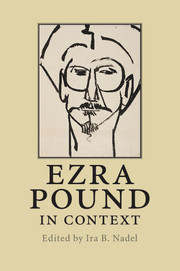Book contents
- Frontmatter
- Contents
- Notes on contributors
- Acknowledgements
- Chronology
- List of abbreviations and note on references to The Cantos
- Introduction
- Part I Biography and works
- 1 Prose criticism
- 2 Poetics
- 3 Translation
- 4 Romance languages
- 5 Letters
- 6 Editor, anthologist
- 7 Education
- 8 Journalism
- 9 Politics
- 10 Economics
- 11 Radio broadcasts
- 12 Law
- 13 Textual criticism
- 14 Archives
- 15 The Lives of Pound
- Part II Historical and cultural context
- Part III Critical reception
- Further reading
- Index
5 - Letters
Published online by Cambridge University Press: 05 July 2014
- Frontmatter
- Contents
- Notes on contributors
- Acknowledgements
- Chronology
- List of abbreviations and note on references to The Cantos
- Introduction
- Part I Biography and works
- 1 Prose criticism
- 2 Poetics
- 3 Translation
- 4 Romance languages
- 5 Letters
- 6 Editor, anthologist
- 7 Education
- 8 Journalism
- 9 Politics
- 10 Economics
- 11 Radio broadcasts
- 12 Law
- 13 Textual criticism
- 14 Archives
- 15 The Lives of Pound
- Part II Historical and cultural context
- Part III Critical reception
- Further reading
- Index
Summary
Pound was a persistent letter writer no matter where he was. From Wabash College in Indiana to the Disciplinary Training Center in Pisa or St. Elizabeths Hospital in Washington, he wrote to defend, cajole, instruct, and inspire. He wrote to writers, students, senators, publishers, newspapers, critics, friends, and enemies. His letters were guides, manifestoes, reports, and political statements. They agitated, praised, complained, and celebrated cultural follies, historical achievements, and individual works. They were never dull. Disciples and presidents, girlfriends and professors were his recipients. His first publication was a letter in the form of a poem to the Jenkintown, PA Times Chronicle in 1902. Nearly his last were letters written almost up to his death to William Cookson, editor of Agenda.
Many letters were literary in their focus. To Harriet Monroe, editor of Poetry, for example, he would often complain, criticize, and occasionally compliment her selections, while also demanding that she print new poets like Frost and Eliot. To William Carlos Williams, he praised his work, but urged him to get out of New Jersey and over to Europe. To Margaret Cravens, he wrote personal letters expressing his appreciation of her support. But his letters also became a platform for his more controversial and extreme views.
Though ignoring the often objectionable gradations of ideologies and beliefs held by Pound in the late 1920s and beyond is no longer tenable for critics and/or readers, it would be easier (though not defensible) to rationalize them or minimize their potency were one to be concerned only with the poetry or even only with the poetry and criticism. Attempts to defend or ignore Pound’s transgressions become absurd in the face of certain of his letters, especially given the fact that in many of them he offers opinions and views that are more clearly expressed and more raw and frank, even if they are not different in import, from the same opinions as these are depicted in his essays and poetry.
- Type
- Chapter
- Information
- Ezra Pound in Context , pp. 54 - 64Publisher: Cambridge University PressPrint publication year: 2010
- 1
- Cited by

